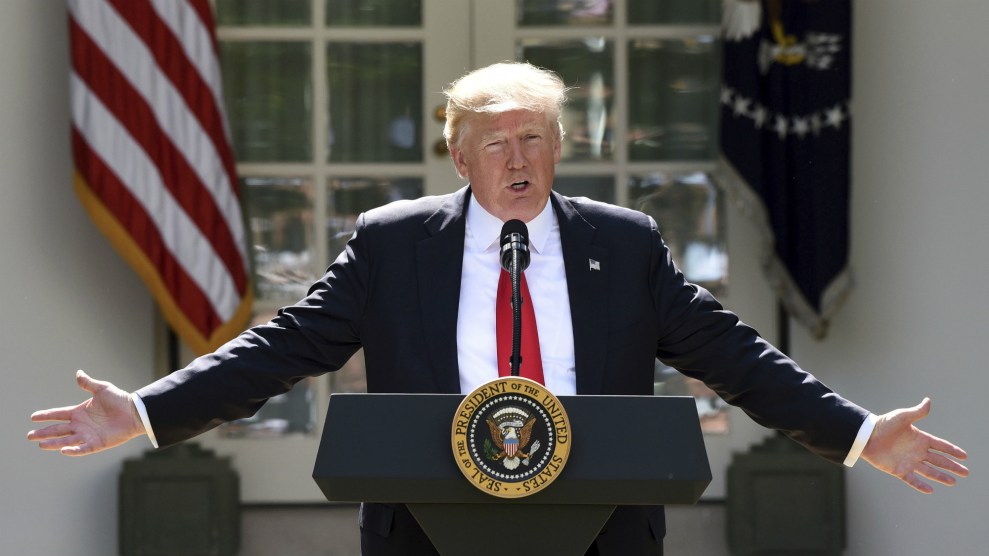
Sipa/AP Images
For indispensable reporting on the coronavirus crisis and more, sign up for Mom Jones’ newsletters
It seems clear now why the Trump administration fought so tough to avoid revealing the details of the waivers it gave to White Home staffers who might otherwise have been in violation of the president’s self-imposed ethics guidelines. They reveal that President Donald Trump, who made “drain the overload” a project battle cry, has enlisted various swamp-dwellers– previous lobbyists, specialists, business executives– to staff crucial positions in his White House and has actually given them broad exemptions to work on concerns straight related to their former jobs and customers.
After consistently knocking DC lobbyists during the campaign, Trump used one of his very first executive orders to lay out ethics rules for his new administration. The prohibitions were not absolute: Waivers would be available in certain cases.
The Trump administration at first balked when the Office of Federal government Ethics demanded the White House hand over the waivers it had approved. But after a standoff the administration relented late Wednesday and launched about 14 waivers covering White Home staffers. They explain that Trump’s principles guidelines are incredibly flexible and that his top staffers don’t require to worry excessive about staying on the ideal side of them. On paper, Trump’s guidelines are similar to those imposed by President Barack Obama, however it appears that Trump is much more happy to distribute exemptions. At this point in the Obama administration, just three White Home staffers had actually been granted ethics waivers. Up until now, Trump has actually granted 14, including a number of that apply to several people.
White House chief of staff Reince Priebus and consultant Kellyanne Conway were both given waivers to deal with issues including their previous companies. Conway is now totally free to work on concerns involving her ex-clients from her previous life as an operative and pollster– clients that included political projects, not-for-profit activist groups, and corporations.
The names of some of her corporate clients likewise have trickled out, consisting of Major League Baseball, Hasbro, American Express, and Boeing The waiver might have been approved to help smooth the method for Conway after proof emerged that she continued to run own her polling and speaking with business even after she ‘d gone to work in the White House– a possible infraction of conflict-of-interest laws that drew the attention of congressional Democrats who have begun penetrating her relationship with the company
Conway’s waiver was not retroactive, but there is another that particularly permits White Home employees to interact easily with former companies and colleagues at media companies– and uses back to January20 Trump’s executive order didn’t just restrict any of his hires from dealing with matters relating to a former employer– it particularly covered “any conference or communication connecting to the performance of one’s official duties.” This means a minimum of two of Trump’s leading assistants, previous Breitbart News chairman Steve Bannon and his assistant Julia Hahn, would be forbidden from chatting with their former associates at Breitbart about anything job-related– a rule that Bannon appears not to have followed While not named, it seems likely that securing the Breitbart alums from principles complaints was the objective.
Another takeaway from Trump’s waivers is that they appear to be far less limiting than Obama administration waivers. Lots of Obama waivers ( there were just 10 overall given to White Home workers throughout his administration) were really narrowly customized. John Brennan, at the time one of Obama’s deputy national security advisors, had actually previously worked for The Analysis Business, and he was granted a waiver to use the business’s data while examining the so-called “Underclothing Bomber” incident.
Trump’s waivers, on the other hand, are broad.
For example, Trump granted a waiver to Michael Catanzaro, who is the president’s most senior energy policy aide, enabling him to work easily on “broad policy matters and particular matters of general applicability connecting to the Clean Power Plan, the WOTUS [Waters of the United States] guideline, and methane regulations.” Catanzaro worked as a registered lobbyist for several oil and gas business as just recently as January, that made the waiver required. On his newest lobbying disclosure form– filed on behalf of one of his customers, gas company Noble Energy– Catanzaro composed that he was dealing with “EPA and BLM’s proposed and final policies covering methane emissions from new and current oil and gas facilities.” Almost identical language appears in his latest lobbying disclosure on behalf of another natural gas company, Encana. To put it simply, Catanzaro is now making policy on the very issues he was paid by corporations to lobby on. There are no limitations in Catanzaro’s waiver relating to his previous clients.
Another lobbyist turned Trump assistant is Shahira Knight, who was previously used as vice president of public law for mutual fund giant Fidelity and now acts as Trump’s special assistant for tax and retirement policy. Her waiver grants her approval to deal with “matters of basic applicability relating to tax, retirement and monetary services problems.” Fidelity’s newest lobbying report– filed while Knight ran its lobbying shop– notes the primary problem areas targeted by the business’s lobbyists: finance, retirement, banking, and taxes.
While the Obama administration reluctantly granted waivers for narrow sets of situations, the Trump waivers appear to be composed to thoroughly exempt the previous lobbying work done by White House aides.
And this is simply the beginning. The administration released only the waivers approved to White Home staff members– the release does not consist of waivers approved to administration officials who work for federal companies, such as the Epa or the Treasury Department. The White House will turn those waivers over to the Office of Government Ethics on Thursday, however it’s not clear when they will be revealed.

